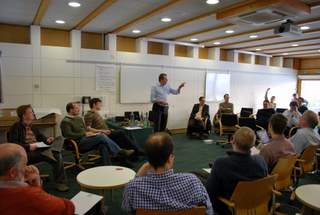
Since the late 1990s, UK universities have been explicitly encouraged - and funded - by the Government to develop their 'third missions', i.e. adding 'application' to their traditional two missions of teaching and research. Public funding for universities is now explicitly linked, in part, to their ability to demonstrate the 'impact' of their research activities. One way of helping ensure that research is more impactful is through the engagement of corporate partners throughout the research process, as funders, collaborators and end-users. Or, to put it another way, universities are now positioning themselves as open innovation partners for corporations.
Many universities have set up dedicated groups to help smooth interactions with industry partners, but what has received much less attention is the need to help academics themselves develop the skills needed to identify, negotiate, setup and manage projects that deliver mutual benefit. Though there is an essential role to be played by university research offices, technology transfer, and corporate liaison offices, as successful technology entrepreneurs know, engaging with customers is something that everyone in the organisation needs to be good at. Recognising this, Cambridge University Computer Lab and the Engineering Department recently ran a workshop to help academics develop their skills for setting up industrial collaborations.

The workshop was delivered by a former Cambridge Engineering Department researcher, who has gone on to run several successful manufacturing and service businesses across Europe: getting an engineer to run the workshop helped avoid some of the Dilbert-esque concerns that might have turned-off potential attendees. 38 academics from across the School of Technology signed up to spend a day learning about the process of identifying and working with potential commercial partners to develop collaborative research activities. Basic negotiation and sales skills were introduced, and delegates then spent the bulk of the day practicing these skills through the delivery of elevator pitches and the series of structured role-plays.
.JPG) One workshop alone will not make a huge difference to the culture and operations of a university. But by showing how partnerships with industry can result in the identification and resourcing of relevant and exciting research topics, and giving people the skills to develop such partnerships, events like this are an important step in the development of universities as useful open innovation partners.
One workshop alone will not make a huge difference to the culture and operations of a university. But by showing how partnerships with industry can result in the identification and resourcing of relevant and exciting research topics, and giving people the skills to develop such partnerships, events like this are an important step in the development of universities as useful open innovation partners. 


